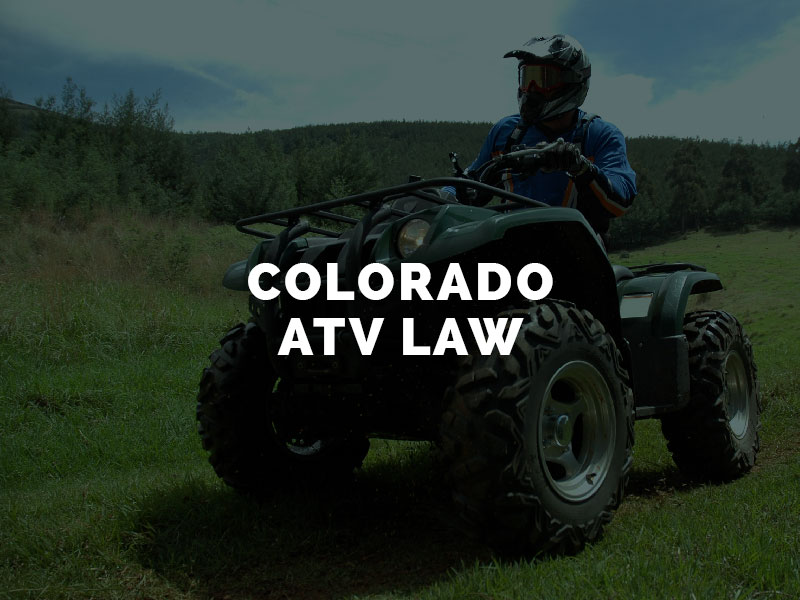Hundreds of operators use all-terrain vehicles (ATVs) in Colorado for both recreational and work purposes. Recreational use of off-highway vehicles is common in some of Colorado’s most beautiful parks and trails, including national parks, while work use is common on farms and plantations. If you plan on using an ATV, you must first learn the state’s related laws. Otherwise, you could get into legal trouble.

No, ATVs are not street legal vehicles in Colorado. According to Colorado Revised Statute 33-14.5-108, you cannot operate an ATV on any public roadway, highway or street in Colorado except in emergency situations or for agricultural purposes. The only exception is if the tract of public land or road has signs designating them for ATV or utility vehicle use. It is dangerous to operate an ATV on the street, as manufacturers do not design them for use on pavement. An ATV operated on pavement is more prone to rollover accidents.
Yes, all ATV owners in Colorado must register and number their vehicles, according to C.R.S. 33-14.5-112. Operating an unregistered ATV, or even owning one, is a crime. Colorado requires registration of all ATVs and utility vehicles in the state, with a few exceptions. You need proof of ownership to register your ATV in Colorado, such as a bill of sale, receipt or certificate of title. You will not need to register your ATV if you are a resident in another state and will be in Colorado for less than 30 days, will only use it for agricultural purposes or an organized race, or will only use it on private property.
You must be at least 10 years old to operate an ATV on public roads in Colorado. This age limit does not apply to private properties, however. ATV operators on public roads between the ages of 10 and 16 must have with them a supervisor with a valid driver’s license. The supervisor must keep the ATV rider within sight at all times. If a child does operate an ATV on public or private lands, the vehicle should be designed specifically for children. A child could suffer serious personal injuries trying to operate an ATV designed for adults. Always follow the operator’s manual for safe and proper use.
You can ride ATVs in Colorado on designated roads and trails, as well as on private properties. Colorado allows ATVs in designated areas within the Grand Mesa Uncompahgre and Gunnison National Forests, for example. You can take an ATV or other off-highway vehicles on dozens of trail riding areas and certain roads in the national forest. The government may close some roads to ATVs for safety reasons or due to traffic volume, however. You may also face seasonal or temporary road closures based on environmental conditions. Colorado upholds a “leave no trace” etiquette for all ATV riders. To find out where you can ride an ATV in your county, check with your local sheriff’s station for specific user information.
You do not need auto or another type of insurance to operate an ATV in Colorado. Purchasing additional ATV liability protection through your homeowners insurance policy, however, could be a good idea in case of a motor vehicle accident. Homeowners insurance that covers ATVs could reimburse you for repairing or replacing a crashed, damaged or stolen vehicle depending on the situation and policy. This could save you a considerable amount of money depending on your ATV and the extent of the damage.
You will only need to wear a helmet on an ATV in Colorado if you are under the age of 18. Riders 17 and under must wear safety helmets that pass the Department of Transportation’s safety standards. Other equipment all ATV riders must have to ride on public roads in Colorado are a head lamp, tail lamp, muffler, spark arrester and brakes. Riding without this equipment or a good helmet, if applicable, could lead to a citation.